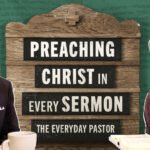The following 20 quotes caught my attention as I read Mark Dever’s helpful and practical little book Understanding Church Leadership (B&H, 2016).
“Think of how care-full a bride’s attendants are as they prepare her to walk down the aisle. Christ wants his leaders no less careful as they prepare his bride.” (1)
“Power apart from God’s purposes is always demonic.” (4)
“To reject authority, as so many in our day do, is short-sighted and self-destructive. A world without authority would be like desires with no restraints, a car with no controls, an intersection with no traffic lights, a game with no rules, a home with no parents, a world without God. It could go on for a little while, but before long it would seem pointless, then cruel, and finally tragic.” (4)
“You don’t want people serving as deacons who are unhappy with your church. The deacons should never be the ones who complain the loudest or jar the church with their actions or attitudes. Quite the opposite! The deacons should be mufflers or shock absorbers. . . . You don’t want to nominate deacons who don’t recognize the importance of the ministry of preaching and teaching, but people who are anxious to protect it. More broadly, you want the most supportive people in the church to serve as the deacons. So when you’re considering who might serve as a deacon, look for people with gifts of encouragement.” (13, 14)
“The first thing to note [in Scripture] about the pastors or elders of a local church is that they are plural.” (17)
“Intercessory prayer is perhaps the most basic ministry of the elders. In order to speak to men for God, elders must speak to God for men.” (24)
“Shepherding, like parenting, requires patience. This kind of work is not done in a single sermon or in a day. Sometimes, of course, God does cause breakthroughs in a single sermon or crucial conversation. But usually the work of eldering is as repetitive and daily as walking the flock to a fresh field for grazing. It is like making the daily meals, or taking the kids to school.” (25–26)
“[My] congregation can get another pastor, but my children cannot get another father, or my wife another husband.” (27)
“Deacons should not act as a separate power bloc or second house of the legislature through which bills need to be passed. If the elders say, ‘Let’s drive to Pittsburgh,’ it’s not up to the deacons to come back and say, ‘No, let’s drive to Philadelphia instead.’ They can legitimately come back and say, ‘Our engine won’t get us to Pittsburgh. Perhaps we should reconsider.’ That’s very helpful. But in general their job is to support the destination set by the elders.” (33)
“As a senior pastor, probably the single most helpful thing to my pastoral ministry has been the recognition of the other elders. . . . They round out my gifts, make up for some of my deficiencies, supplement my judgment, and create support in the congregation for decisions.” (34)
“Neither nominating committees nor trustees are found on the pages of the New Testament. You will look in vain for finance committees or small group leadership teams. Belief in the sufficiency of Scripture doesn’t forbid such structures; it just relativizes their authority.” (36)
“Congregationalism is biblical, but the congregation is not inerrant.” (36)
“It is a serious spiritual deficiency in a church either to have leaders who are untrustworthy or members who are incapable of trusting.” (37)
“You as a church member either need to trust your leaders or replace them. But don’t say that you acknowledge them and then not follow them. . . . Rather than distrusting church leaders, let me encourage you to talk behind your elders’ backs: meet in secret and plot to encourage your leaders. Strategize to make the church leaders’ work not burdensome, but a joy.” (37–38)
“Satan’s lie—that authority can never be trusted because it is always tyrannical and oppressive—will be subverted by the elders’ benevolent exercise of authority.” (38–39)
“Membership is not simply a name on a piece of paper or our declaration of affection toward the place we grew up. It must reflect a living commitment . . . or it is worthless.” (43)
“Uninvolved ‘members’ confuse both real members and non-Christians about what it means to be a Christian. And we ‘active’ members do voluntarily ‘inactive’ members no service when we allow them to remain members of the church, since membership provides the church’s corporate endorsement of a person’s salvation. Please understand: membership is the church’s corporate testimony to an individual’s salvation. So how can a congregation honestly testify that someone it never sees is faithfully running the race?” (44)
“Don’t say you belong to the church if you won’t join a church.” (45)
“You should not join a church to be saved, but to help you make certain you are saved. . . . Your membership in a local church is that congregation’s public testimony that your life gives evidence of regeneration. It doesn’t save, but it reflects salvation. And if there is no reflection, how can we be sure about our claims of salvation?” (45)
“Joining a church helps us counter our wrong individualism and discover the corporate nature of Christianity.” (46)
“Too many churches today present a version of Christianity in which all sufferings are accounted for, all sacrifices rewarded, and all mysteries explained in this life. . . . If you evaluate a Christian’s life this side of eternity, it will not add up. Christ’s didn’t; Paul’s didn’t. Ours shouldn’t either.” (51)
Involved in Women’s Ministry? Add This to Your Discipleship Tool Kit.
 We need one another. Yet we don’t always know how to develop deep relationships to help us grow in the Christian life. Younger believers benefit from the guidance and wisdom of more mature saints as their faith deepens. But too often, potential mentors lack clarity and training on how to engage in discipling those they can influence.
We need one another. Yet we don’t always know how to develop deep relationships to help us grow in the Christian life. Younger believers benefit from the guidance and wisdom of more mature saints as their faith deepens. But too often, potential mentors lack clarity and training on how to engage in discipling those they can influence.
Whether you’re longing to find a spiritual mentor or hoping to serve as a guide for someone else, we have a FREE resource to encourage and equip you. In Growing Together: Taking Mentoring Beyond Small Talk and Prayer Requests, Melissa Kruger, TGC’s vice president of discipleship programming, offers encouraging lessons to guide conversations that promote spiritual growth in both the mentee and mentor.

































